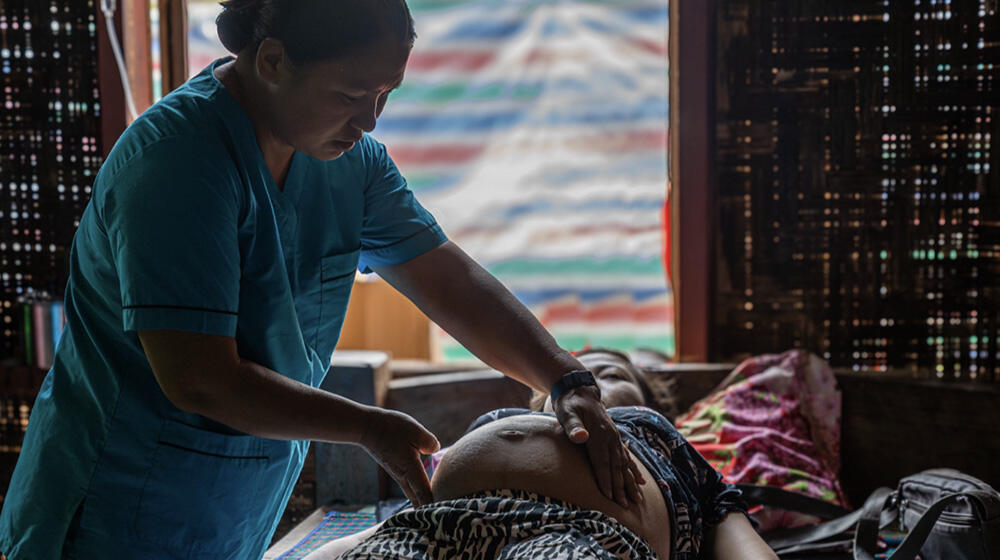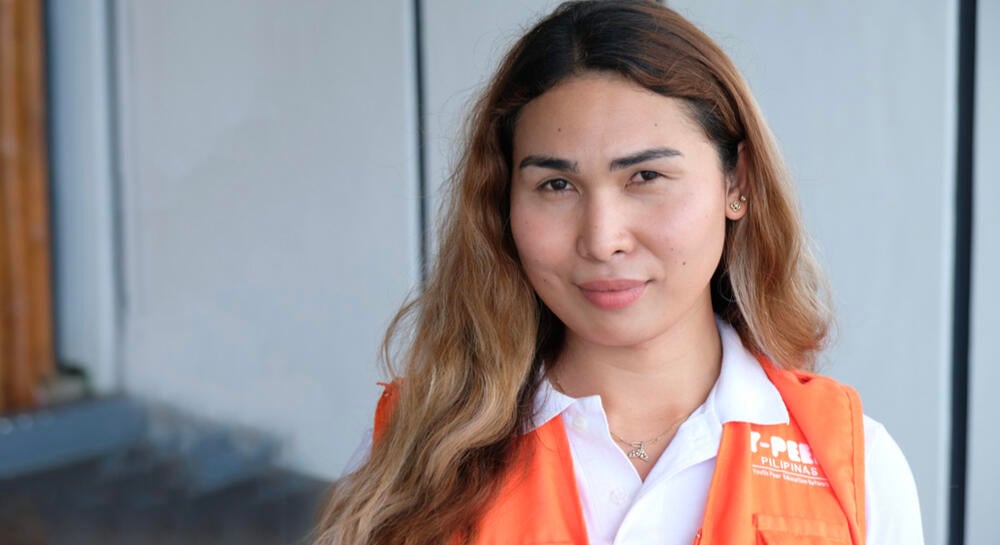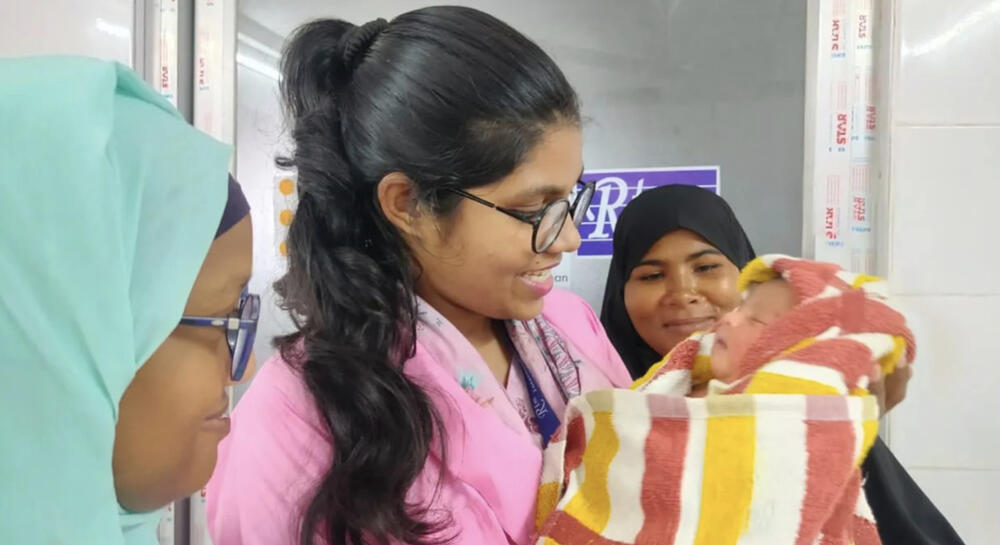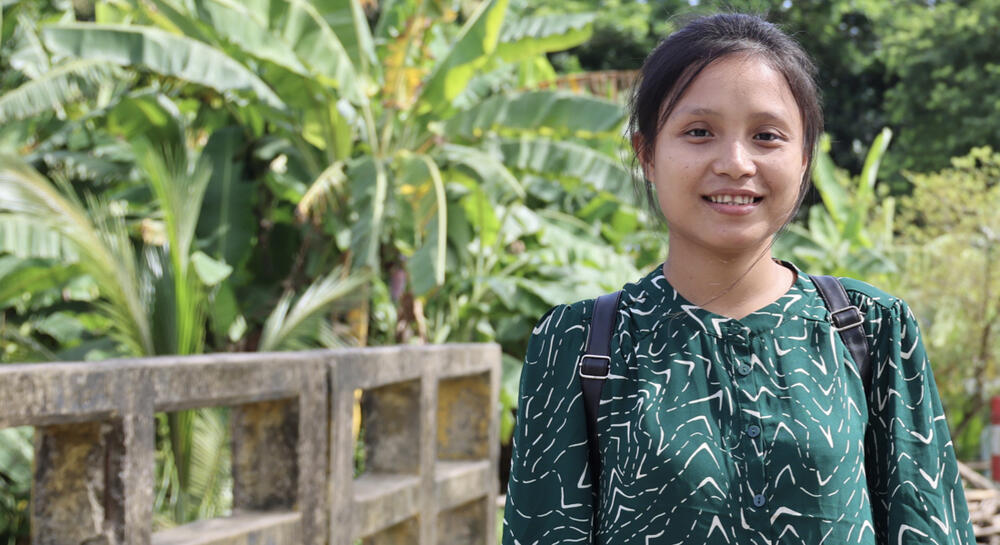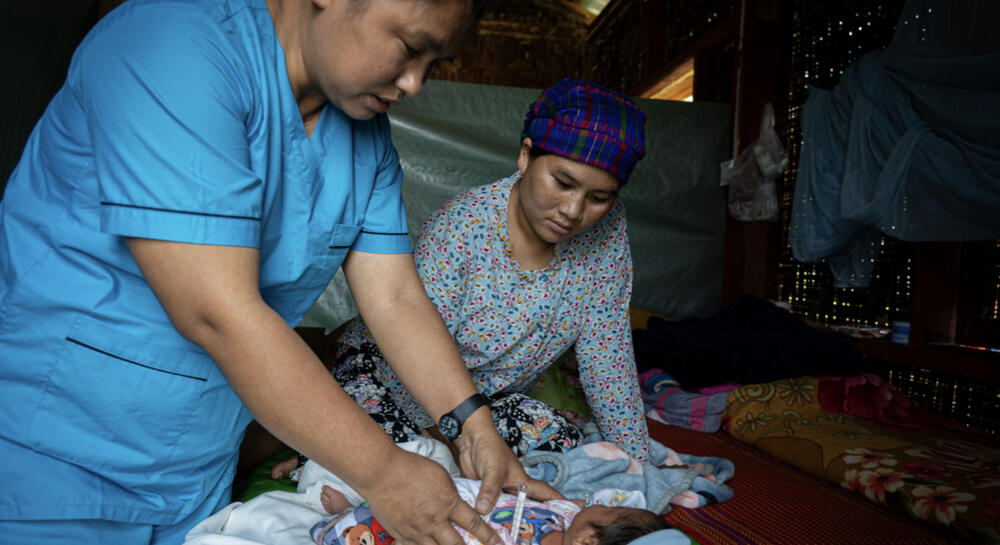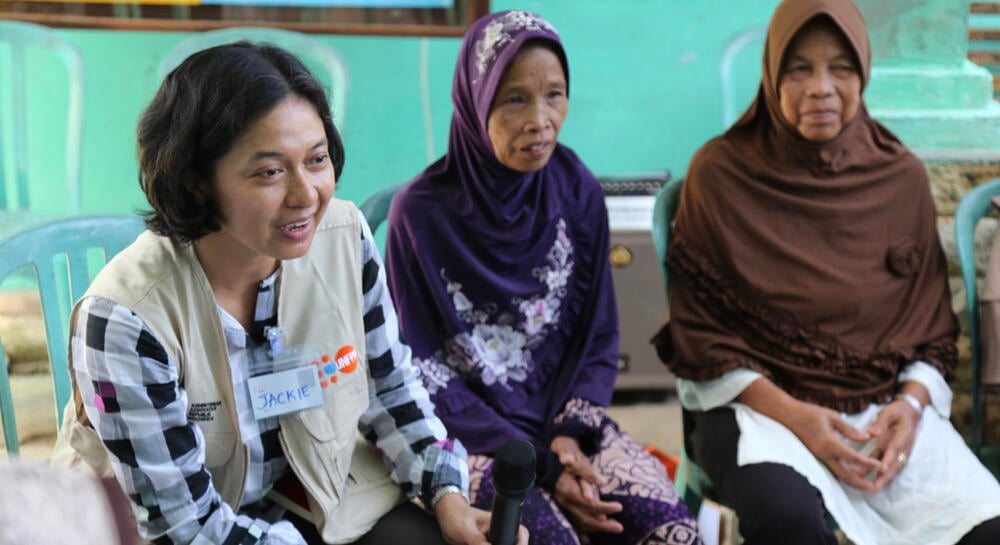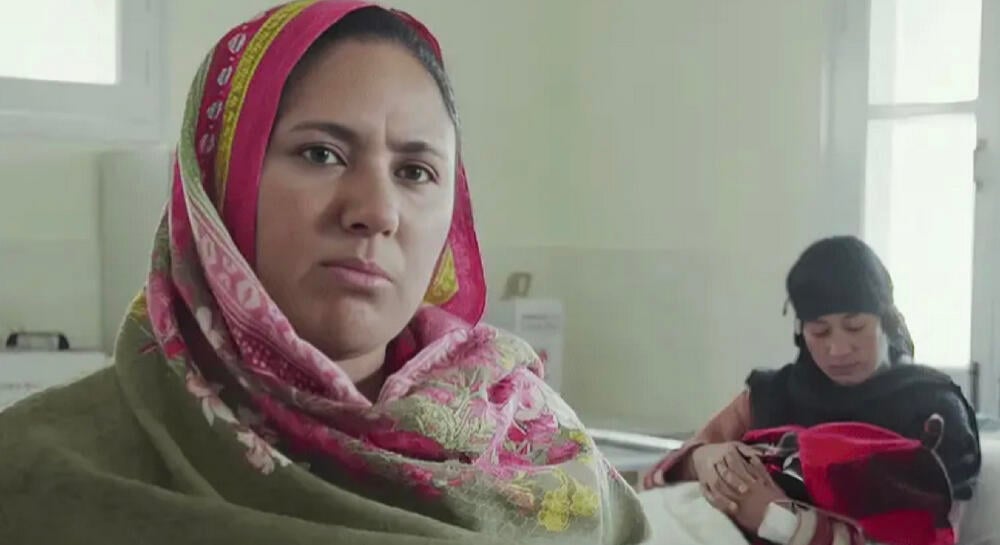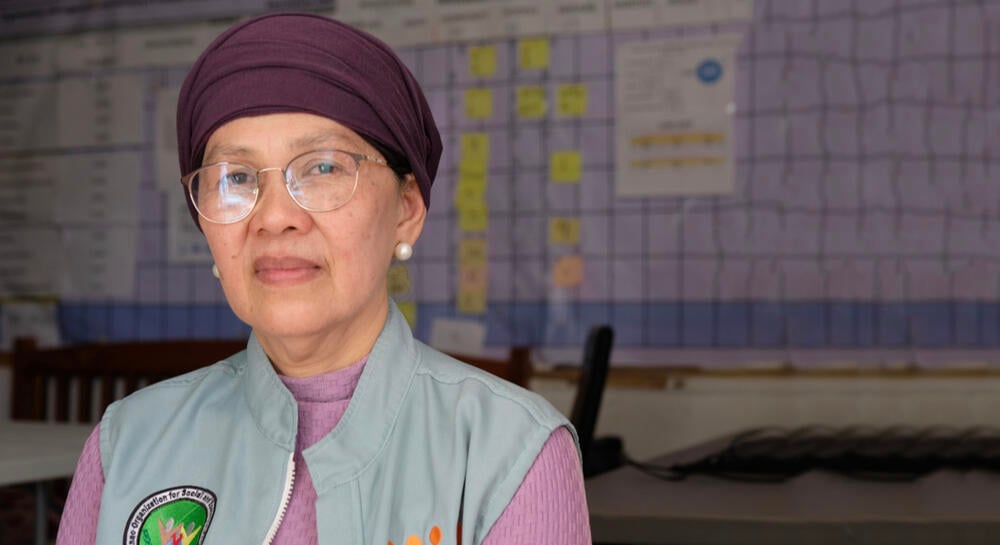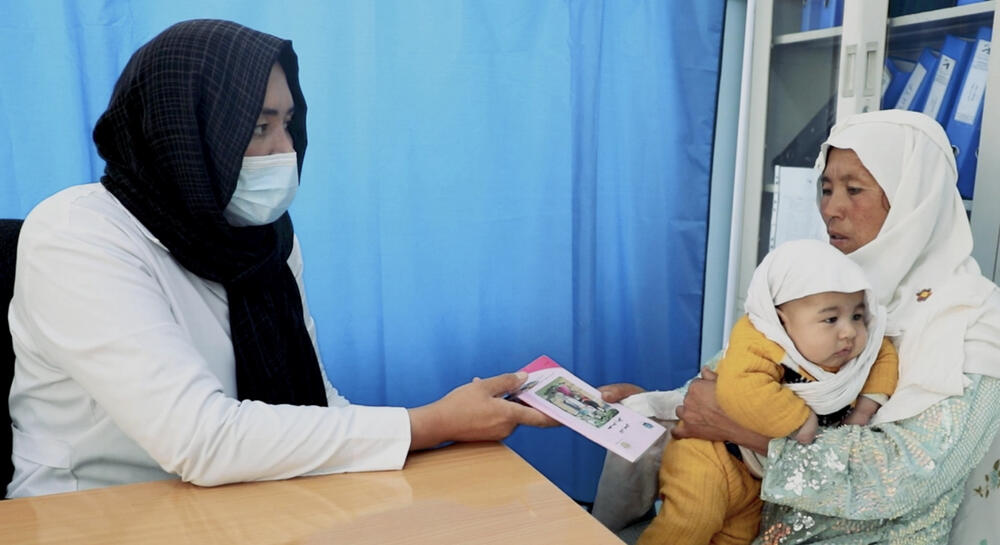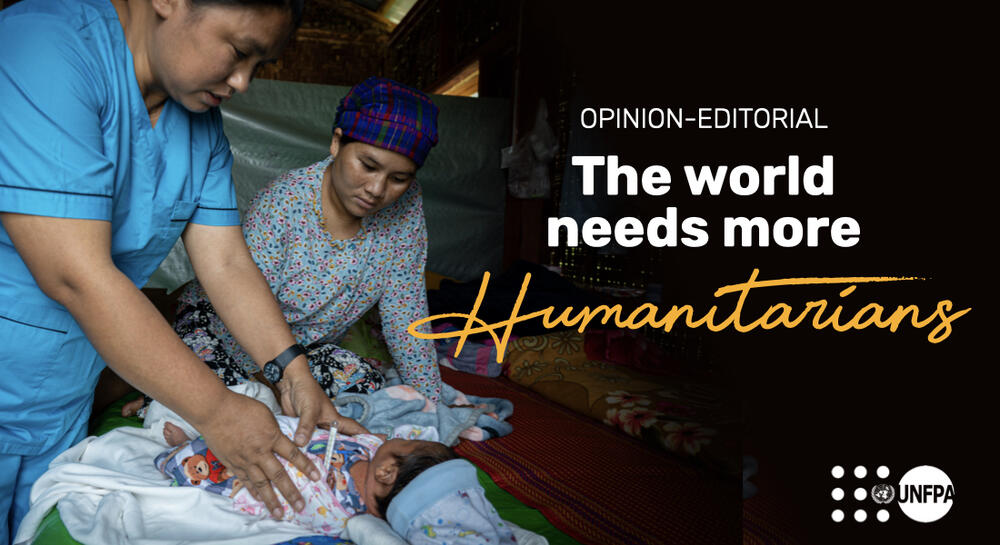Humanitarians put their lives on the line to uphold fundamental rights, like sexual and reproductive health and rights, ensuring that every individual receives the information and services they need to maintain their health and well-being. We honour their courage and commitment to protecting human rights in the most extreme situations.
As we celebrate humanitarians for their service on World Humanitarian Day, governments and civil society must take decisive action to prepare for future emergencies. Investing in and equipping local, skilled health professionals is essential to respond effectively and save lives when climate disasters hit. As the most disaster-prone region in the world, in 2022 alone, over 140 disasters struck Asia and the Pacific, leading to over 7,500 deaths and affecting over 64 million people.
This collection of stories celebrates some of the humanitarians on the frontline of emergencies in Asia-Pacific.
Philippines: Chrisly Orit de Asis is a humanitarian aid worker with UNFPA’s youth mobilizing partner Youth Peer Education Network (Y-PEER) Pilipinas. Chrisly is a proud transgender woman in an extremely conservative part of the Philippines and she struggled to be accepted even in her own family. Her leadership has inspired a whole generation of youth in Southern Leyte and increased focus on services that reach marginalized groups, especially in emergencies. Chrisly has been part of the disaster response to Super Typhoon Odette that devastated her community in 2022. Her inclusive approach helped provide reproductive health services to young people in the aftermath of the storm when homes, roads and clinics were destroyed. Chrisly knows that the next disaster response will depend on the networks she builds before the crisis. Together with other Y-PEER leaders, Chrisly is leading discussions among youth to break taboos around gender and sexual health. ©UNFPA/Rose READ MORE
“To be part of a humanitarian response makes me understand the needs of people on the ground. It's not just about what’s happening at a surface level; I feel more connected to what people need.”
-Chrisly Orit de Asis
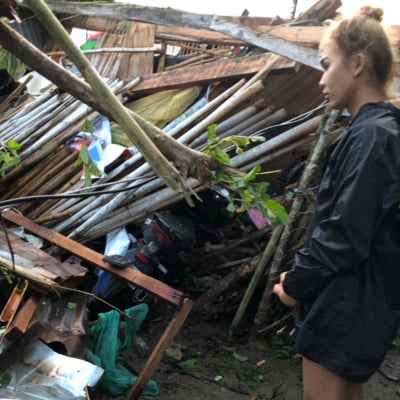 |
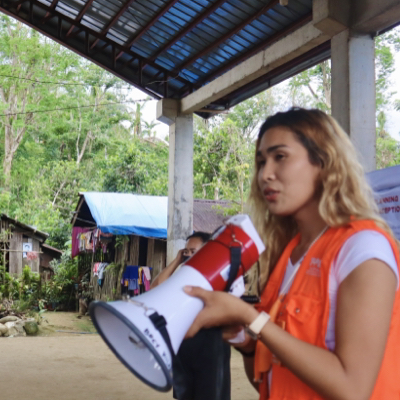 |
Bangladesh: Arafin Mim is a midwife deployed on the island of Bhasan Char. “It is an isolated place where they need midwifery services most because it is separated from the mainland.”
In the 15 months that Arafin has worked on Bhasan Char in Bangladesh, the island has been impacted by four cyclones. The frequent, hazardous weather events force the Rohingya residents and healthcare providers to commute between the settlements and emergency shelters on the island.
Arafin Mim recalls when 17-year-old Shohida Begum went into labor during Cyclone Hamoon in October 2023. Shohida had a high-risk pregnancy - she was diagnosed with anemia and was at risk of postpartum hemorrhage. Arafin Mim and her team intervened, assisting Shohida in safely delivering a healthy baby. The delivery was facilitated by the use of a solar-powered emergency light kit. Throughout the process, her husband remained by her side. ©RTM International/Jubayda Akter READ MORE
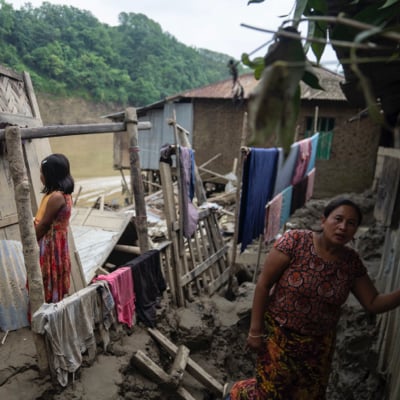 |
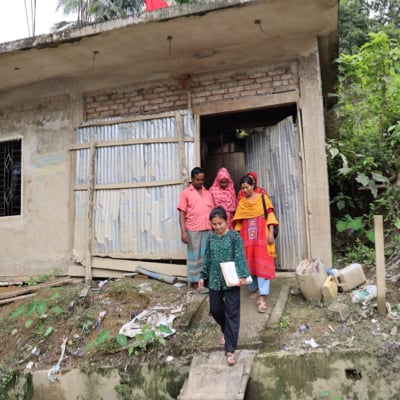 |
Bangladesh: When flash floods hit Bandarban last year, Ma Mya and her family were displaced. “I wanted to make a meaningful impact, even after being displaced by the floods,” she says. Ma Mya began a journey to help the women affected by this tragedy.
The floods in Bandarban impacted 1.3 million people, including 17,500 pregnant women and 117,000 adolescent girls. The disaster amplified vulnerabilities to gender-based violence. UNFPA responded by distributing dignity kits and essential supplies.
Ma Mya volunteered with a UNFPA partner organization called ‘Tajindong.’ Through this work she met with women and girls struggling with the aftermath of the floods. Her mission was not just about delivering supplies; it was about listening and gathering stories. “Their stories are testaments of resilience in the face of disaster, tales of enduring hardship and narratives of hope.”
Ma Mya encountered the challenges faced by young girls during their menstrual cycles due to the lack of proper sanitation facilities. She heard from pregnant mothers coping with the loss of their homes who were left with a just piece of cloth to change. Families in makeshift tents by the roadside or in shelter homes with strangers, shared their struggles and aspirations with Ma Mya. ©UNFPA Bangladesh/Alka Ferdous READ MORE
“I wanted to make a meaningful impact, even after being displaced by the floods,”
-Ma Mya, Bangladesh
Myanmar: In the temporary shelter at a camp for internally displaced persons from Kachin, Lamawng transforms a simple space into a life-saving facility. Her expertise as a midwife serves as a comforting presence for expectant mothers at the camp who are anxious about their baby’s health.
"Displaced women staying in camps, including pregnant women, need essential health care and family planning services,” she says. “There is no proper delivery room here. We have to use a tarpaulin to set up a temporary room for delivery."
As the only midwife in the camp, Lamawng assists pregnant women throughout the stages of pregnancy, childbirth, and postpartum. Her expertise enables her to quickly detect and manage life threatening conditions, ensuring stabilisation and timely referrals for higher level care. This underscores the pivotal role of midwives in safeguarding the health and wellbeing of women in high risk situations. The crisis is compounded by the exacerbated needs for essential reproductive health services in the camps for people displaced by violence.
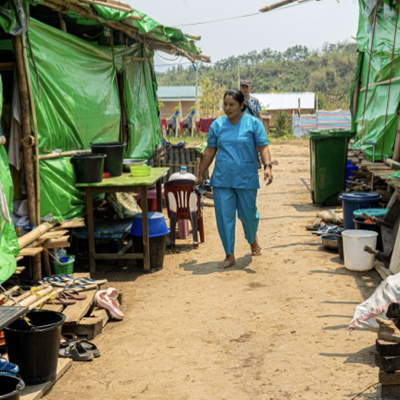 |
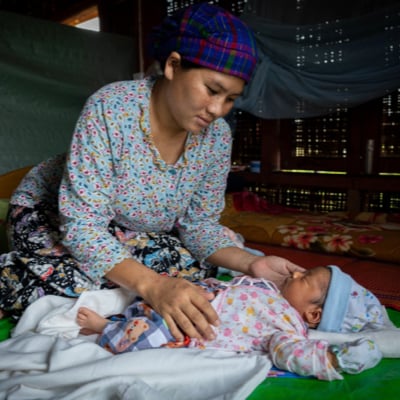 |
“My journey as a midwife, especially here among those displaced by conflict in Kachin, is marked by long, arduous days that can be physically and emotionally draining,” Lamawng says. “Yet, it is in these moments—seeing the smiles of mothers who I've assisted, witnessing their joy and relief—that fuel my commitment to this calling. Each smile not only brings me joy but also renews my strength and dedication to continue serving the women and girls of this community.” ©UNFPA Myanmar READ MORE
Indonesia: Jackie Viemilawati is a psychologist, counsellor and experienced humanitarian with Yayasan Pulih, a non-government organization that provides mental health and psychosocial support in Indonesia. “We are focused on the issue of violence and trauma recovery which also includes gender-based violence in development settings and in emergency and conflict settings," Jackie says. “We advocate the issue of the importance of psychological healing and recovery for people who have experienced disasters, especially survivors of gender-based violence.”
Jackie has experienced multiple emergencies in her career as a counsellor. “It's interesting why they call it humanitarian work,” she says. “It is a context where you can feel humanity emerging in this kind of situation. You can see how people strive to survive and how they show resilience. I always learn from that.”
She says the high number of disasters in Indonesia increases the risk of gender-based violence. “We support the health workers with psychosocial support because they are affected by the emergency. Health workers like midwives need mental health support so that they can provide that quality care to survivors of gender-based violence.” ©UNFPA/ Indonesia READ MORE
“It's interesting why they call it humanitarian work. It is a context where you can feel humanity emerging in this kind of situation. You can see how people strive to survive and how they show resilience. I always learn from that.”
-Jackie Viemilawati,Yayasan Pulih
Pakistan: Nafas Bibi is a midwife at Aga Khan Basic Health Center (BHC) in Shuist, in a remote part of Upper Chitral. Midwives play a critical role as frontline healthcare providers in Khyber Pakhtunkhwa because it is so isolated. Nafas Bibi says midwives are known for their accessibility, adaptability and community-focused approach.
In the harsh winters of Pakistan, snow storms often last days and getting mothers to facilities for a safe birth is even harder than normal. “When there is a knock on your door after-midnight in the dead of winter, it means someone needs help,” Nafas Bibi is trained in emergency birth and depends on a network of health workers devoted to saving lives. ©UNFPA/ Pakistan READ MORE
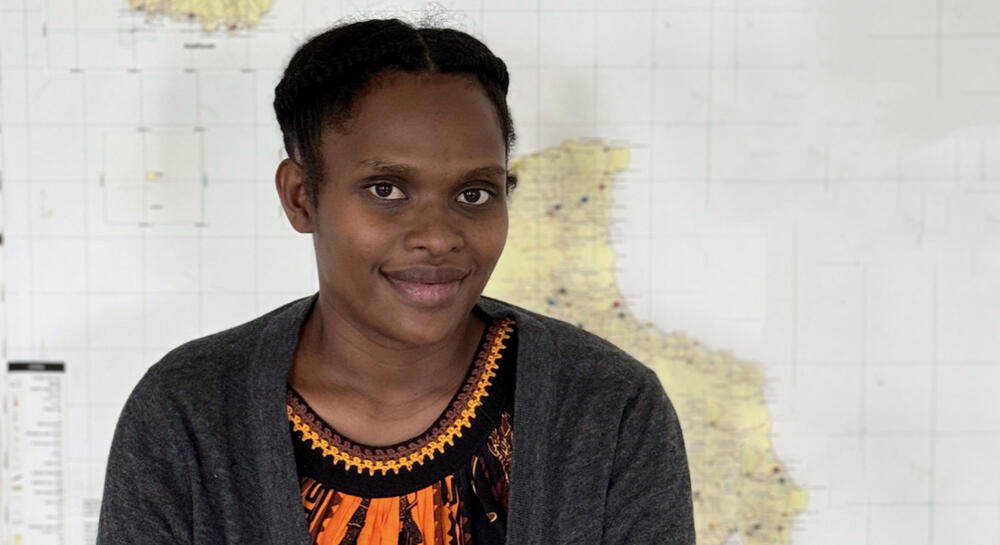
Vanuatu: “We go to affected areas and we distribute hygiene kits,” says Annelie Tari from Ambae. She works with ADRA Vanuatu, an NGO that coordinates first responders in the immediate aftermath of a crisis. ADRA provides psychosocial support, protection, health and WASH services.
Vanuatu is one of the most cyclone prone countries in the world and Ann volunteers in humanitarian responses to help women and girls in remote communities who are affected by frequent cyclones. “Most of the girls in the villages don’t know anything about the items in the dignity kits. What we do is explain how to use those items like the reusable pads.”
Annelie went out to the outer island of Malekula and distributed kits. “It was badly damaged during Cyclone Lola in 2023,” she says. “After the cyclone women were just using a piece of cloth. We distributed the items and they were so happy that they could wash and reuse the pads.” ©UNFPA Pacific/Olana Naigulevu
Philippines: Bai Masla Beng Campiao is a humanitarian aid worker with four decades of experience in conflict and crisis in Mindanao. She leads the work of the Mindanao Organization for Social and Economic Progress (MOSEP), UNFPA’s essential partner in addressing the impact of the protracted crisis in Mindanao. MOSEP runs a network of nearly 20 Women Friendly Spaces. Dangenan nu mga babay is the Maguindanaon term which roughly means, ‘space where women with sore hearts can heal’. Amid the complex conflict landscape in the Bangsamoro Autonomous Region in Muslim Mindanao (BARMM) -- due to clan feuds, armed conflict stemming from separatist movements, and challenges in transitioning to a fully autonomous region -- families in affected areas are forced to flee and sometimes stay in evacuation camps for extended periods of time. The Women Friendly Spaces provide a place for women to recover and access information and services in areas of cash support, nutrition and reproductive health. Beng grew up during an acute phase of the fighting in Mindanao and she recalls being forced to carry munitions under her hijab to her uncles in the forest. She says the experience of violence gave her a deep commitment to healing that shaped her path as a nurse and now as a dedicated humanitarian worker on the front lines of crises. ©UNFPA/Rose READ MORE
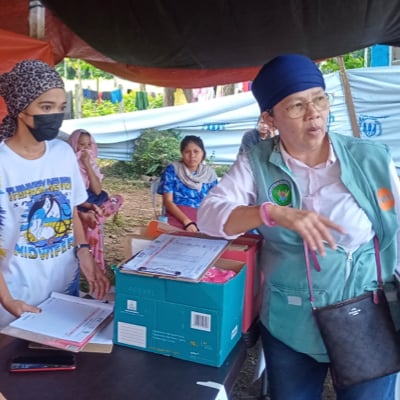 |
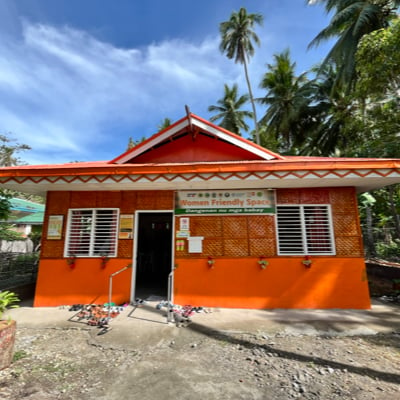 |
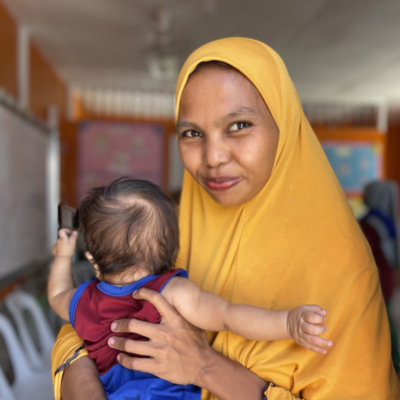 |
Afghanistan: “If I left, a mother or a baby could have died. I stayed because people, especially pregnant women, need my support.”
Midwife Mariza Ahmadi had been serving at the Ahangaran Family Health House for just a year when in August 2021, her commitment to her lifesaving work was put to a test. At that time, the country descended into chaos due to the uncertainty of the situation following the withdrawal of foreign troops from Afghanistan.
Among the most affected were public health facilities, which have either closed or rendered non-functional due to the lack of health workers coming to work.
“I was also worried but I could not leave because people needed our services… pregnant women were worried about where to deliver, as health facilities were closing,” Ms. Ahmadi recalled. “So I did not close the Family Health House.” ©UNFPA/ Afghanistan WATCH THE VIDEO
Learn more
The Regional Prepositioning Initiative
Dignity & Disasters: a regional advocacy campaign calling for collective efforts to protect fundamental rights threatened by the impacts of the climate crisis.
Minimum Initial Service Package - The minimum, life-saving sexual and reproductive health needs that humanitarians must address at onset of an emergency
GBV Area of Responsibility brings together non-governmental organisations, UN agencies, academics and others under the shared objective of ensuring life-saving, predictable, accountable and effective GBV prevention, risk mitigation and response in emergencies, both natural disaster and conflict-related humanitarian contexts)
United Nations Office for the Coordination of Humanitarian Affairs

